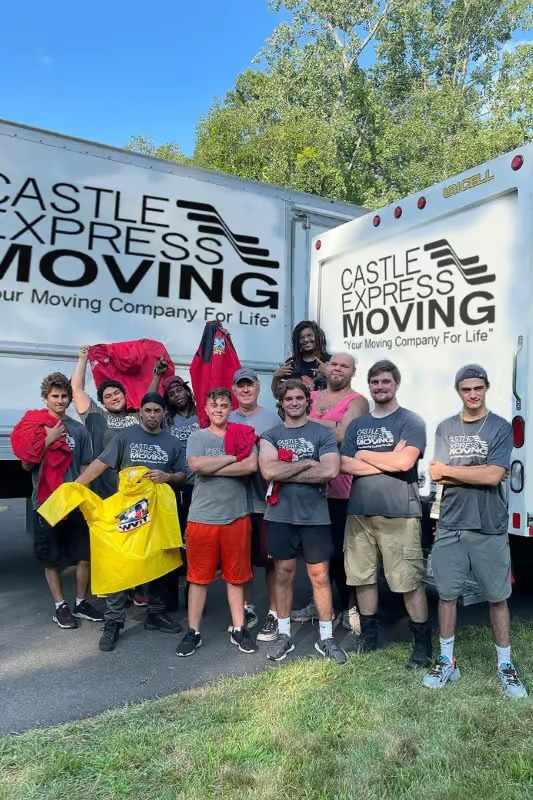
Moving to a new home can feel overwhelming, but having a solid packing plan makes the process much smoother. Whether you’re relocating within Glastonbury, Hartford, West Hartford, Enfield, or even across the border to Springfield, Massachusetts, knowing what to pack first can save you time and stress. In this guide, Castle Express Moving shares expert advice on which items to pack first to ensure an efficient and organized move.
1. Start with Non-Essential Items
Begin by packing the items you don’t use daily. This helps reduce clutter and allows you to focus on essentials as moving day approaches. Examples of non-essential items include:
Seasonal clothing and footwear
Holiday decorations
Books, DVDs, and collectibles
Extra kitchenware (such as specialty appliances and serving dishes)
Artwork and decorative pieces
Packing these items early will help clear up space and make it easier to organize the rest of your belongings. Consider donating or selling items you no longer need to lighten your load.
2. Pack Up Storage Areas
Attics, basements, garages, and storage closets are often filled with items that aren’t needed for daily living. Sorting through these areas first will help lighten the load and make moving day less stressful. Be sure to:
Donate or discard items you no longer need
Label storage boxes clearly for easier unpacking
Protect fragile items with proper padding
Storage areas can also contain forgotten or rarely used items. This is a great time to declutter and determine what truly needs to come to your new home.
3. Box Up Out-of-Season Clothes and Linens
If you're moving during the summer, you won’t need your winter coats and heavy blankets right away. Packing seasonal clothing, linens, and extra bedding first frees up space and simplifies the transition.
Sort through your wardrobe and linens, packing them neatly into labeled boxes. Vacuum-sealed storage bags can help save space and keep your items protected during the move.

4. Organize Kitchen Items
Your kitchen is one of the most challenging areas to pack, so start with items you use the least. Pack things like:
Special occasion dishware and glassware
Small appliances (blenders, mixers, coffee machines, etc.)
Pantry items that won’t be used before the move
Leave out just enough kitchenware to last until moving day, such as a few plates, cups, and utensils. Packing dishes and fragile items with care using bubble wrap or packing paper will prevent breakage. Additionally, consider using dish towels and linens to wrap breakable items for added protection.
5. Gather Important Documents and Valuables
Before packing everything up, set aside important personal items, including:
Passports, birth certificates, and financial records
Jewelry and sentimental keepsakes
Medications and essential medical documents
To prevent loss or damage, keep these with you rather than loading them onto the moving truck to prevent loss or damage. Store these items in a secure, easily accessible folder or small bag.
6. Pack Electronics and Cables
Electronics such as laptops, gaming consoles, and entertainment systems should be packed carefully to avoid damage. When packing electronics:
Use their original boxes if available
Wrap screens and delicate parts in bubble wrap
Label cords and cables to simplify setup at your new home
Taking photos of your electronics' connections before unplugging them can make reinstallation much easier. You should also store cables and accessories in zip-lock bags labeled with their corresponding devices.
7. Prepare an Essentials Box
Pack a box with items you’ll need immediately upon arriving at your new home. This should include:
Toiletries and personal hygiene items
A few changes of clothes
Chargers for phones and electronics
Basic kitchen items (snacks, coffee, disposable plates, and cutlery)
Important tools (scissors, screwdrivers, and a flashlight)
Having an essentials box ensures you have everything you need without digging through multiple boxes on your first night in your new home. If you have furry friends moving with you, include essential pet supplies in the box.
8. Disassemble Furniture and Large Items Early
If you have large furniture that needs to be taken apart, start early to avoid rushing on a moving day. Items such as bed frames, bookshelves, and dining tables should be disassembled gradually. Be sure to:
Keep screws and small parts in labeled plastic bags
Use blankets or furniture pads to prevent scratches
Label each part to make reassembly easier
Disassembling furniture ahead of time will help movers load the truck more efficiently and prevent potential damage during transit.
9. Plan for Perishables and Cleaning Supplies
As moving day gets closer, start using up food from the refrigerator and pantry to minimize waste. Dispose of expired items and pack only what you can transport easily. If you plan to bring perishable items, use a cooler with ice packs.
Cleaning supplies should be kept accessible to tidy up your old home before leaving and for a quick clean-up at your new place. Consider packing a separate box with:
Disinfectant wipes
Trash bags
Paper towels
Multi-purpose cleaner
A broom and dustpan
Final Thoughts
Packing in the right order ensures a smooth, stress-free moving experience. By tackling non-essential items, storage areas, and seasonal belongings first, you’ll stay organized and avoid last-minute chaos. Labeling boxes, donating unneeded items, and protecting fragile belongings will make unpacking much easier.
Additionally, planning ahead for electronics, furniture, and cleaning supplies can help streamline the process. With careful preparation, you can enjoy a seamless move to your new home.
Whether you're moving in Glastonbury, Hartford, West Hartford, Enfield, or Springfield, Massachusetts, Castle Express Moving is here to help make your transition seamless. Contact us today for professional moving assistance and a hassle-free experience!








Write a comment ...